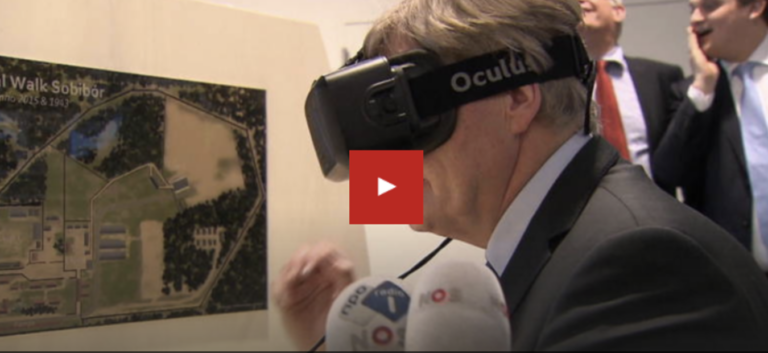Visitors to National Monument Camp Vught can now view the disappeared Sobibór extermination camp in Virtual Reality. At the request of the Ministry of Health, Welfare and Sport, a group of scientists, including Harry van Vliet, AUAS Crossmedia lecturer, will investigate whether this experience can play a role in increasing young people’s historical awareness. Visitors to Kamp Vught can see what the Sobibór extermination camp looked like through the Oculus Rift, advanced glasses that allow the viewer to see depth and to look around in 360 degrees.
The VR tour was developed by the design agency, at the request of the Ministry of Health, Welfare and Sport (VWS). The ministry wants to investigate whether this form of new media can contribute to the historical awareness of young people, now that the generation that experienced the Holocaust is disappearing and the memory of it is becoming increasingly distant. The Ministry of Health, Welfare and Sport also wants to investigate whether this VR tour of Sobibór can contribute to preserving and/or strengthening the memory of the Holocaust. Can this new medium play a role in raising awareness among young people?
The researchers will start in March and will interview 300 young people aged 12 to 18 before and after the VR experience. Research design The research into the effects of Sobibór’s VR tour is being conducted by Prof. dr. dr. Kees Ribbens, Senior researcher NIOD / Endowed professor Erasmus School of History, Culture and Communication, EUR; prof. dr. Carolien Rieffe, professor by special appointment of Developmental Psychology, Leiden University; dr. Harry van Vliet, Crossmedia lecturer, Amsterdam University of Applied Sciences; prof. dr. Paul Verschure & Sytse Wierenga MA, MSc, media technology experts & researchers, Universitat Pompeu Fabra Barcelona.
Because ‘historical awareness’ is difficult to measure, they will map the direct effect on young people: the degree of empathy, involvement and knowledge that the viewers show before and after. The effect may also depend on the knowledge or involvement that someone already has with the topic. The researchers therefore provide half of the research population with information in advance and compare the two groups. In Kamp Vught, the VR experience is not presented to school classes, but only to young people who come with their parents, because written permission from the parents is required for young people up to the age of 17. Part of the test set-up will take place at the Amsterdam University of Applied Sciences.
